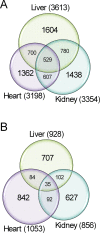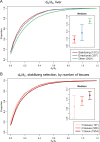Gene regulation in primates evolves under tissue-specific selection pressures
- PMID: 19023414
- PMCID: PMC2581600
- DOI: 10.1371/journal.pgen.1000271
Gene regulation in primates evolves under tissue-specific selection pressures
Erratum in
- PLoS Genet. 2009 Mar;5(3). doi: 10.1371/annotation/06105fdb-f0fa-4fe2-88d0-db9f6036509f doi: 10.1371/annotation/06105fdb-f0fa-4fe2-88d0-db9f6036509f
Abstract
Regulatory changes have long been hypothesized to play an important role in primate evolution. To identify adaptive regulatory changes in humans, we performed a genome-wide survey for genes in which regulation has likely evolved under natural selection. To do so, we used a multi-species microarray to measure gene expression levels in livers, kidneys, and hearts from six humans, chimpanzees, and rhesus macaques. This comparative gene expression data allowed us to identify a large number of genes, as well as specific pathways, whose inter-species expression profiles are consistent with the action of stabilizing or directional selection on gene regulation. Among the latter set, we found an enrichment of genes involved in metabolic pathways, consistent with the hypothesis that shifts in diet underlie many regulatory adaptations in humans. In addition, we found evidence for tissue-specific selection pressures, as well as lower rates of protein evolution for genes in which regulation evolves under natural selection. These observations are consistent with the notion that adaptive circumscribed changes in gene regulation have fewer deleterious pleiotropic effects compared with changes at the protein sequence level.
Conflict of interest statement
The authors have declared that no competing interests exist.
Figures






References
-
- Clark AG, Glanowski S, Nielsen R, Thomas P, Kejariwal A, et al. Positive selection in the human genome inferred from human-chimp-mouse orthologous gene alignments. Cold Spring Harb Symp Quant Biol. 2003;68:471–477. - PubMed
-
- Bustamante CD, Fledel-Alon A, Williamson S, Nielsen R, Hubisz MT, et al. Natural selection on protein-coding genes in the human genome. Nature. 2005;437:1153–1157. - PubMed
Publication types
MeSH terms
Substances
Grants and funding
LinkOut - more resources
Full Text Sources
Molecular Biology Databases

